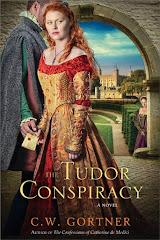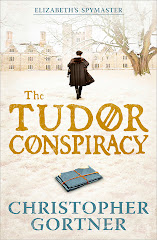 Michelle Moran has carved a niche for herself in bringing to life the tumult and drama of the ancient world. From the intrigues and tragedies of ancient Egypt's most famous queen, NEFERTITI, to the struggles and triumph of her neice in THE HERETIC QUEEN, Michelle has enthralled readers with her vivid descriptions of a legendary time and people. Now, in her third novel, CLEOPATRA'S DAUGHTER, we meet Selene, daughter of Egypt's doomed last pharoah, who is brought as a hostage to Rome along with her brothers, and whose keen instincts for survival help her forge a new life for herself. As colorfully rendered and meticulously researched as Michelle's previous efforts, CLEOPATRA'S DAUGHTER is also a marvelous cross-over historical novel which will appeal to adults and young adults alike.
Michelle Moran has carved a niche for herself in bringing to life the tumult and drama of the ancient world. From the intrigues and tragedies of ancient Egypt's most famous queen, NEFERTITI, to the struggles and triumph of her neice in THE HERETIC QUEEN, Michelle has enthralled readers with her vivid descriptions of a legendary time and people. Now, in her third novel, CLEOPATRA'S DAUGHTER, we meet Selene, daughter of Egypt's doomed last pharoah, who is brought as a hostage to Rome along with her brothers, and whose keen instincts for survival help her forge a new life for herself. As colorfully rendered and meticulously researched as Michelle's previous efforts, CLEOPATRA'S DAUGHTER is also a marvelous cross-over historical novel which will appeal to adults and young adults alike.Michelle has kindly offered me this guest post, which sheds light on her research techniques and the importance of creating an authentic world for her readers. Please join in me in giving Michelle Moran a warm welcome!
Life and Libraries in the Classical Age by Michelle Moran
One of the most frequent questions I’m asked by readers is what life was like two thousand years ago wh en Julius Caesar walked the corridors of the Senate house and Cleopatra visited Rome. Surprisingly, life for the ancient Romans was not unbelievably different from today. The Romans had many of the little luxuries that we often associate exclusively with the modern world. For example, baths were to be found in every city, and public toilets were viewed as a necessity. The toilets depicted in HBO’s Rome Series are copies of those discovered in Pompeii, where those caught short could find a long stretch of latrines (much like a long bench with different sized holes) and relieve themselves next to their neighbor. Shops sold a variety of wigs, and women could buy irons to put curls their hair. For the rain, there were umbrellas, and for the sun, parasols. Houses for the wealthy were equipped with running water and were often decorated quite lavishly, with elaborate mosaics, painted ceilings, and plush carpets.
en Julius Caesar walked the corridors of the Senate house and Cleopatra visited Rome. Surprisingly, life for the ancient Romans was not unbelievably different from today. The Romans had many of the little luxuries that we often associate exclusively with the modern world. For example, baths were to be found in every city, and public toilets were viewed as a necessity. The toilets depicted in HBO’s Rome Series are copies of those discovered in Pompeii, where those caught short could find a long stretch of latrines (much like a long bench with different sized holes) and relieve themselves next to their neighbor. Shops sold a variety of wigs, and women could buy irons to put curls their hair. For the rain, there were umbrellas, and for the sun, parasols. Houses for the wealthy were equipped with running water and were often decorated quite lavishly, with elaborate mosaics, painted ceilings, and plush carpets.
In the markets, the eager shopper could find a rich array of silks, along with linen and wool. You could also find slaves, and in this, Roman times certainly differ from our own. While some men spoke out against it, one in three people were enslaved. Most of these slaves came from Greece, or Gaul (an area roughly comprising modern France). Abuse was rampant, and the misery caused by this led desperate men like Spartacus to risk death for freedom.
For those few who were free and wealthy, however, life in Rome provided nearly endless entertainments. As a child, there were dolls and board games to be played with, and as an adult, there was every kind of amusement to be had, from the theatre to the chariot races. Even the poor could afford “bread and circuses,” which, according to Juvenal, was all the Romans were really interested in.
For those more academic minded, however, there were libraries. Although I don’t portray this in Cleopatra’s Daughter, libraries were incredibly noisy places. The male scholars and patrons read aloud to themselves and each other, for nothing was ever read silently (the Romans believed it was impossible!). Other cities were renowned for their learning, too: Pergamum (or Pergamon) was the largest and grandest library in the world. Built by the Greeks, Pergamum became Roman property when Greece was captured and many of its people enslaved. The library was said to be home to more than 200,000 volumes, and it is was in Pergamum that the history of writing was forever changed.
Built by Eumenes II, Pergamum inspired great jealousy in the Egyptian Ptolemies, who believed that their Library of Alexandria was superior. In order to cripple this Greek rival (and also because of crop shortages), Egypt ceased exporting papyrus, on which all manuscripts were written. Looking for an alternative solution, the Library of Pergamum began using parchment, or charta pergamena. For the first time, manuscripts were now being written on thin sheets of calf, sheep or goat’s skin. The result of this change from papyrus to parchment was significant. Now, knowledge could be saved by anyone with access to animal hide. Manuscripts (although still quite rare) were now available to more people. Alas, so impressive was this vast Pergamese library of parchment that Cleopatra asked Marc Antony to ship its entire contents to her as a wedding gift. This transfer marked the end of Pergamum’s scholarly dominance, and is the reason why, today, we remember Alexandria as possessing the ancient world’s greatest library.
One of the most frequent questions I’m asked by readers is what life was like two thousand years ago wh
 en Julius Caesar walked the corridors of the Senate house and Cleopatra visited Rome. Surprisingly, life for the ancient Romans was not unbelievably different from today. The Romans had many of the little luxuries that we often associate exclusively with the modern world. For example, baths were to be found in every city, and public toilets were viewed as a necessity. The toilets depicted in HBO’s Rome Series are copies of those discovered in Pompeii, where those caught short could find a long stretch of latrines (much like a long bench with different sized holes) and relieve themselves next to their neighbor. Shops sold a variety of wigs, and women could buy irons to put curls their hair. For the rain, there were umbrellas, and for the sun, parasols. Houses for the wealthy were equipped with running water and were often decorated quite lavishly, with elaborate mosaics, painted ceilings, and plush carpets.
en Julius Caesar walked the corridors of the Senate house and Cleopatra visited Rome. Surprisingly, life for the ancient Romans was not unbelievably different from today. The Romans had many of the little luxuries that we often associate exclusively with the modern world. For example, baths were to be found in every city, and public toilets were viewed as a necessity. The toilets depicted in HBO’s Rome Series are copies of those discovered in Pompeii, where those caught short could find a long stretch of latrines (much like a long bench with different sized holes) and relieve themselves next to their neighbor. Shops sold a variety of wigs, and women could buy irons to put curls their hair. For the rain, there were umbrellas, and for the sun, parasols. Houses for the wealthy were equipped with running water and were often decorated quite lavishly, with elaborate mosaics, painted ceilings, and plush carpets.In the markets, the eager shopper could find a rich array of silks, along with linen and wool. You could also find slaves, and in this, Roman times certainly differ from our own. While some men spoke out against it, one in three people were enslaved. Most of these slaves came from Greece, or Gaul (an area roughly comprising modern France). Abuse was rampant, and the misery caused by this led desperate men like Spartacus to risk death for freedom.
For those few who were free and wealthy, however, life in Rome provided nearly endless entertainments. As a child, there were dolls and board games to be played with, and as an adult, there was every kind of amusement to be had, from the theatre to the chariot races. Even the poor could afford “bread and circuses,” which, according to Juvenal, was all the Romans were really interested in.
For those more academic minded, however, there were libraries. Although I don’t portray this in Cleopatra’s Daughter, libraries were incredibly noisy places. The male scholars and patrons read aloud to themselves and each other, for nothing was ever read silently (the Romans believed it was impossible!). Other cities were renowned for their learning, too: Pergamum (or Pergamon) was the largest and grandest library in the world. Built by the Greeks, Pergamum became Roman property when Greece was captured and many of its people enslaved. The library was said to be home to more than 200,000 volumes, and it is was in Pergamum that the history of writing was forever changed.
Built by Eumenes II, Pergamum inspired great jealousy in the Egyptian Ptolemies, who believed that their Library of Alexandria was superior. In order to cripple this Greek rival (and also because of crop shortages), Egypt ceased exporting papyrus, on which all manuscripts were written. Looking for an alternative solution, the Library of Pergamum began using parchment, or charta pergamena. For the first time, manuscripts were now being written on thin sheets of calf, sheep or goat’s skin. The result of this change from papyrus to parchment was significant. Now, knowledge could be saved by anyone with access to animal hide. Manuscripts (although still quite rare) were now available to more people. Alas, so impressive was this vast Pergamese library of parchment that Cleopatra asked Marc Antony to ship its entire contents to her as a wedding gift. This transfer marked the end of Pergamum’s scholarly dominance, and is the reason why, today, we remember Alexandria as possessing the ancient world’s greatest library.
Thank you, Michelle! To find out more Michelle Moran and her work, please visit her website.

.jpg)











